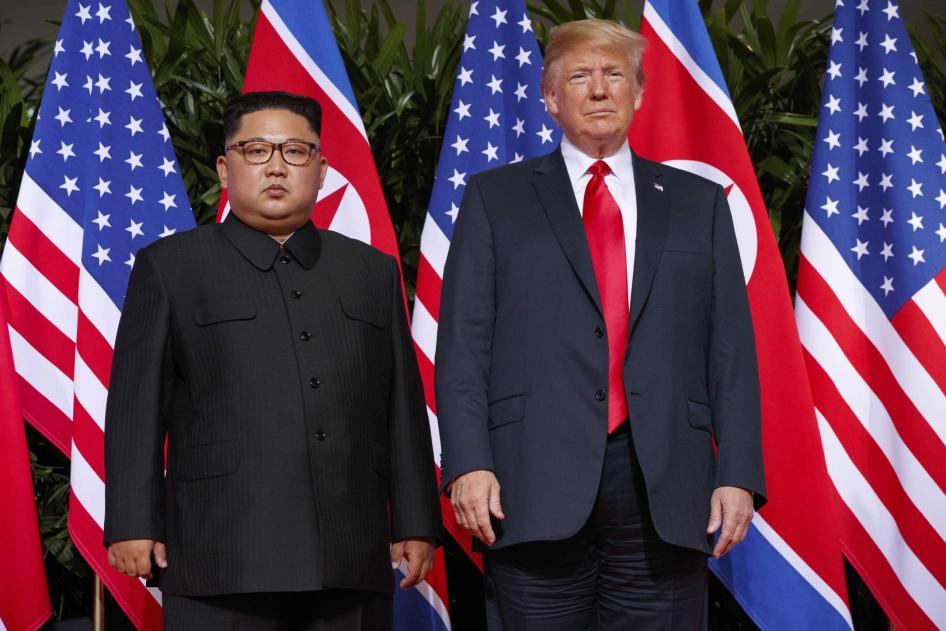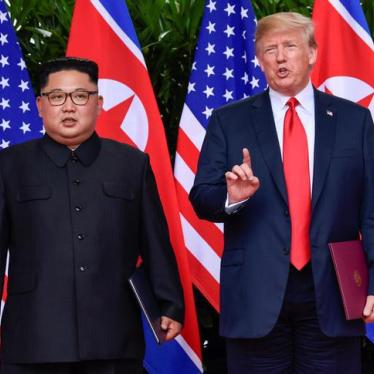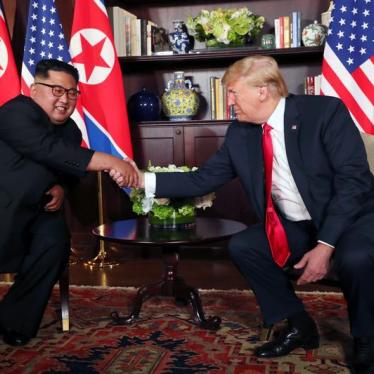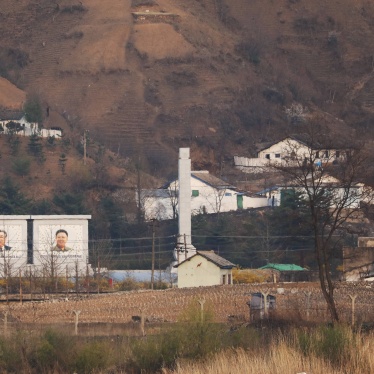A little over a year ago, before a packed joint session of Congress for the 2018 State of the Union address, President Donald Trump took a moment to recognize a North Korean escapee in the audience named Ji Sung-ho. Ji escaped from North Korea in 2006 and became an advocate for North Korean human rights. When he rose from his seat and raised the simple wooden crutches on which he fled North Korea and that he has kept to remember his ordeal, the chamber roared in a standing ovation.
It was a singular moment of bipartisan harmony: different parties and branches of government coming together to recognize a man’s sacrifices, unified in revulsion at the totalitarian regime he fled. Soon thereafter, the crowd gave a standing ovation to the parents of Otto Warmbier, the American college student arrested during a tourist trip to North Korea who died from injuries suffered in captivity. Pyongyang sent Warmbier back to the United States in June 2017 unconscious and he died days later.
What a difference a year makes. In the months since that address, the Trump administration and the president himself have dramatically softened their diplomatic posture on North Korea’s human rights record. Back in late 2017, in Seoul, Trump spoke of “the horror of life in North Korea,” calling Kim Jong Un’s government a “cruel dictatorship” under which North Koreans “suffer in gulags, toiling in forced labor, and enduring torture, starvation, rape and murder on a constant basis.” But by April 2018, when preparations for a summit on nuclear issues were underway, the administration’s tone changed.
The June 2018 summit that followed was marked by smiles, warm words, and general promises for further talks. Trump, in comments to reporters, said little about rights and there were few indications it would be raised in future discussions. A few months later, Trump gave a startling description about his evolving relationship with Kim: “And then we fell in love, okay? No really.” In his recent State of the Union address, when raising North Korea, he spoke only of weapons proliferation, adding that “my relationship with Kim Jong Un is a good one,” and that he and Kim would meet again on February 27 and 28 in Vietnam.
The softening in rhetoric should not be chalked up simply to diplomacy or the false idea that complicated negotiations require the U.S. to “play nice” on human rights to achieve success in weapons proliferation.
Human rights have often been raised in major diplomatic negotiations. President Ronald Reagan kept a firm line on Soviet human rights abuses even as he sought major nuclear weapons reduction treaties with the USSR. President Bill Clinton’s envoy for the Balkans peace talks, Richard Holbrooke, did not shy away from raising human rights concerns with leaders like Slobodan Milošević during negotiations. The Dayton Peace Accords directly addressed the topic.
Indeed, in many cases diplomatic negotiations are more likely to succeed when they are comprehensive—focusing not merely on a narrow issue but putting multiple topics on the table, especially if they are interlinked. In North Korea, human rights issues are inextricably linked with the weapons proliferation program, since the military widely uses forced labor to build infrastructure and support its operations, as U.S. officials have previously noted.
Many North Korea experts, including some who have participated in previous talks, acknowledge that raising human rights in negotiations is a practical necessity. It is widely understood that successful and durable verification of any counter-proliferation process will require North Korea to not only restore access to the International Atomic Energy Agency but also improve its cooperation with the UN system in general. Verifying counter-proliferation agreements is hard enough in authoritarian countries. It is much harder yet in totalitarian ones.
Negotiators should ask North Korea, as a start, to begin broader cooperation with the UN system, as a trust building exercise and path toward other international visits. Similarly, the United States should press North Korea to join the International Labour Organization and end its endemic use of forced labor. Cooperation with these requests can serve as an initial benchmark of a willingness to reform.
In the end, however, the simplest reason why human rights need to be part of the conversations in a negotiation intended to result in broad relief from U.S. sanctions is that there is no other choice: under a key law passed in 2016, a significant part of the broader-based sanctions imposed on North Korea’s government are specifically related to human rights issues. Under U.S. law, these broader sanctions cannot be lifted, or even waived, unless North Korea takes steps to improve its human rights record.
President Trump, of course, is not a particularly credible voice on human rights in North Korea, due to his rhetorical vacillations, his embrace of Kim and other strongmen, and his own abusive domestic practices in immigration law and other areas. In this particular case, however, Congress has tied his hands. He must, by law, raise human rights issues if he intends to remove broad sanctions on North Korea, and he and other U.S. officials need to start explaining this to their North Korea counterparts.
As the Feb. 27 summit nears, members of Congress, including those who stood and applauded for the North Korean defector Ji Sung-ho and who voted for legislation to increase pressure on North Korea, should weigh in aggressively to ensure that these important messages are delivered.








